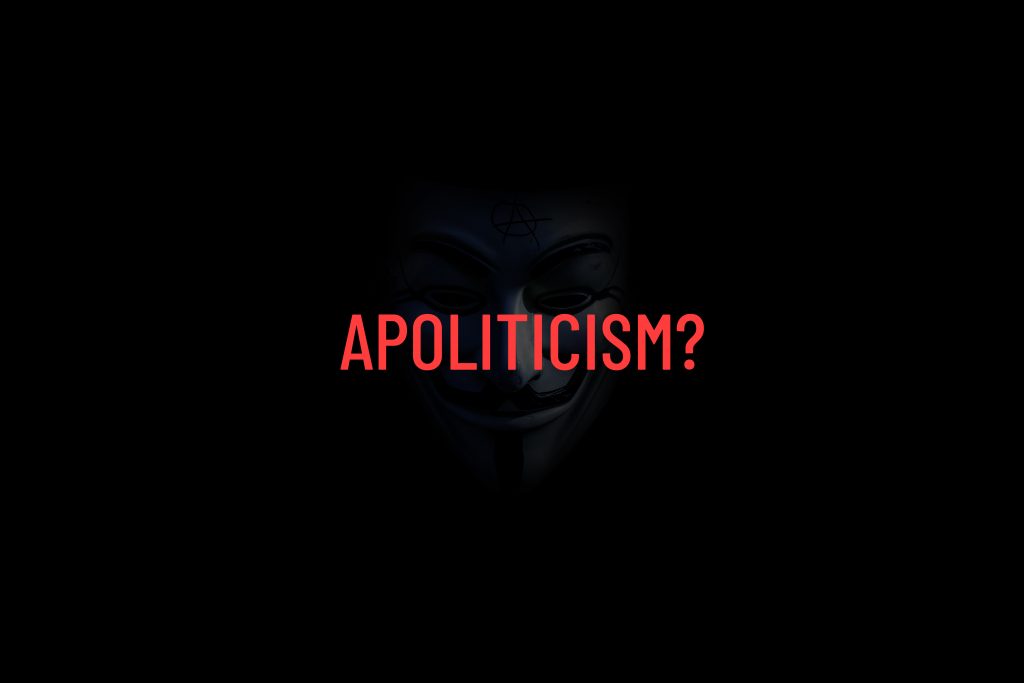
I just happened to watch an interview video of Parvathy Menon where she says “being apolitical is the biggest crime”. That made me think. Not only that, I have been seeing many such posts on Instagram, Facebook and other social media. It actually made my mind convoluted. For a moment I was unsure if I was political or not. Conscious thinking and writing are my go-to methods to organize thoughts inside my mind. So I decided to contemplate on this and this blog is a result of that.
Is it true that apoliticism is a bad thing? What is the definition of apoliticism? Anyway, who gets to define these words?
Definitions are given to ideas and actions to distinguish between them during communication. It is not always practical or possible to give clear-cut definitions, because ideas are not always quantized or in a self-contained form. Some ideas exhibit a continuous transition from one to the other. There can be this grey area where definitions are completely ambiguous and subjective at best. The definition you hold for a term can be entirely different for somebody else. This is unlike Science, where definitions are always logical and unambiguous. Anyone can independently verify scientific definitions as long as they follow the standards.
So before I share my opinions, I must provide the definitions of the terms I would use and be consistent throughout. This is so that if you hold a different definition for a term I use, you can always use the definition I have given and infer the meaning. The inference is unavoidable here because I will be sharing my perspectives.
To define what apoliticism is, we also need to know what being political is. A democratic society fundamentally consists of two things,
- Society, a group of people having varying ideas and intentions.
- An assembly of democratically elected individuals who are responsible for making policies and administering.
The primary goal of this system is to drive development through policy-making and administration, what we call governing. There’s not just one way to achieve development, but many. Two individuals may have different opinions about attaining that common goal. When you consider society as a whole, you will see that varying fractions of people are sharing similarities in their opinions and views.
That’s where politics comes into the picture. If a large number of people are sharing common views about achieving development, then they can be brought under a simple collection called a political faction or political party. Individuals within the political party may have slightly different opinions, but they are outshined by the similarities they share.
A democratic election seeks to find which of these sets of ideas is held up by the majority, and thus allow it to put the policies into action, and drive development for a pre-agreed duration. Recall that, the goal is to achieve development, regardless of the manner it is so done.
As a citizen, you may have a concrete or loose set of opinions about administration and development. When you try to list them yourself and compare them with others, you will find similarities. There may or may not exist a political party with exactly the same opinion as yours. Yet, you are drawn to the political party with the most similarities. That’s how you find your personal political alignment. This should happen at an intellectual level, through your own reasoning. But unfortunately, people are mostly drawn to political alignment through brainwashing and political inheritance. This means, less thinking is involved there.
When the political alignment is strong, you can affiliate with the political view you like, creating a political affiliation. This expects you to stick to the political views and their methods, and be critical of other views. Defending your own political views with the context of historical records and facts is extremely important for ideas to evolve and mature. This kind of healthy political debate is an important aspect of democracy.
When you choose a political affiliation, something else comes into play; biases. Biases are inclinations in opinions and thinking towards something that is not logically apparent to an external viewer. For example, you may be inclined to think that China intentionally created COVID-19 causing viruses, if you really hate China and its policies. It completely disregards the biological and scientific aspects and the objective and consequences of such an effort.
Your personal biases run on top of your cognitive biases. Cognitive biases are the inclination of your judgment and decision-making towards things you are more “comfortable” with, aka your preconceptions. Cognitive biases are evolutionarily a good thing because it helps us make practical decisions faster based on our experiences and the lack of them. But cognitive biases can, most times, be irrational or illogical.
When you affiliate yourself with a political view, you’re most likely to be biased in your opinions and actions. Even if you are not biased, you will be naturally forced to agree with the majority opinion of the political party you associate with. Simply “പാർട്ടി പറയുന്നതാണ് ശരി, പാർട്ടിയെ ചോദ്യം ചെയ്യരുത്” type of dilemma.
So what is the escape from it? Being politically aligned is natural. It is simple statistics that you find yourself similar to others in opinions. But being politically affiliated is a choice you make. Is there an alternative to being politically affiliated? Well, you can be politically aligned and still not be politically affiliated if you choose to. You can be neutral and unbiased. If you are ever confronted with the question “ഏതാ പാർട്ടി?”, it is perfectly okay to say “I am not affiliated with any political parties”. Society expects to you be affiliated with a political party and that’s what they call “normal”.
Normal is not always right, and it is perfectly okay to be not normal at times. Being apolitical means you yourself identify as not having any political affiliations. On the other hand, if you say you’re not politically aligned, statistics will slap you in the face.
Apolitical : politically neutral; without political attitudes, content, or bias.
That’s the definition of Apolitical as per Collins English Dictionary.
Being political and apolitical are individual choices you make. It is perfectly okay to choose either. Nobody should force it on anybody else. Being either should not be considered as better or right than the other. Those who would state being apolitical is a crime is implicitly asking you to join a political party, or yourself declare as being affiliated with a political view. This is like a ritual of affiliation or faith. Deciding to affiliate oneself with a political view increases the chance of you strengthening all the parties. “നീ നമ്മുടെ പാർട്ടിയിൽ ചേരണം, നമുക്ക് അത് ഒരു സ്ട്രെങ്ത് ആയിരിക്കും” type of persuasions.
But there’s something else hanging in the air. Is it okay to be apolitical and not take part in the democratic process? Complete democratic abstinence? IT IS NOT if you accept Democracy as the best possible system for governing. Apolitical and nondemocratic are different things. If you think democracy is not the way to go, then you’re nondemocratic. That means you can tag yourself whatever alternative view you have. Some of these are dictatorial, monarchic, authoritarian, etc. You can be apolitical and democratic at the same time.
In any case, use your brains, think yourself. Don’t let others do the thinking for you. Be rational and factual. Keep equal freedom, rights, and development for all above your political alignments and affiliations. Engage in healthy debates with your political and apolitical peers.
But if you’re trying to be apolitical and not give a fuck about how your country is functioning even when enjoying the freedom and comfort it gives you, aka “apolitical and chill”, I would say “പോടാ മൈ#”.
Now, who am I to say all these? What formal knowledge do I have of political science? Do I understand all the terms and definitions? I do not. This is just my expression of thoughts and nothing more.



Good one. Keep writing.
Thank you 🙂